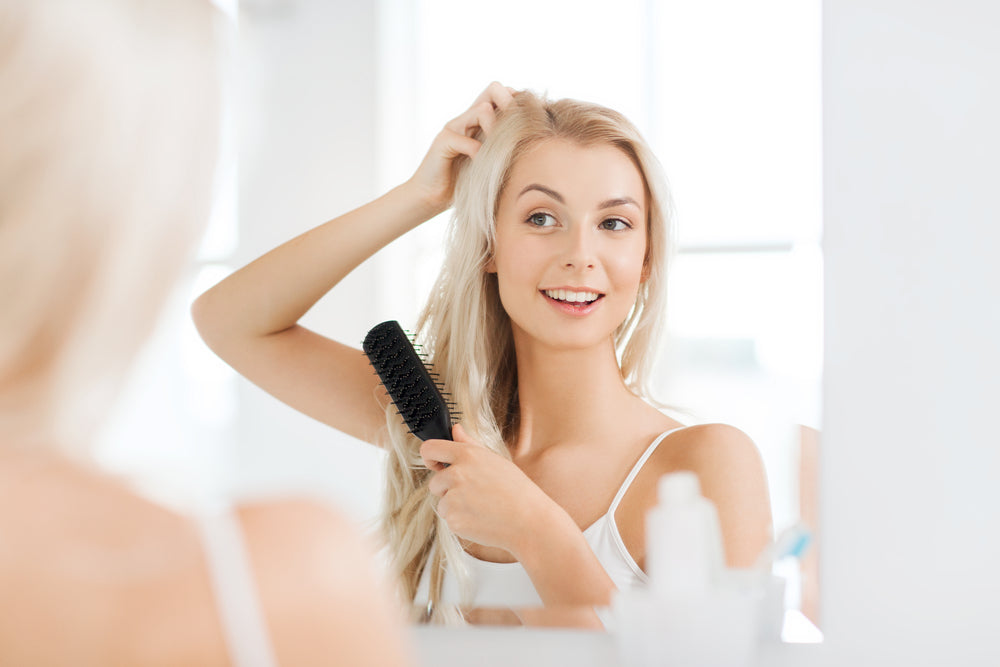Collagen has long been known to improve the condition of your hair and skin, and influence the strength and growth rate of your nails. But what exactly is the relationship between collagen and hair, and how can collagen help with hair loss?
What is the relationship between collagen and hair?
The primary protein of hair is keratin. Keratin is largely made up of an amino acid called Proline, which is largely obtained from your diet and then broken down in the body to form the building blocks of hair, skin and nails.
Proline is one of the three main amino acids that collagen is composed of. Through consuming collagen, whether through foods or supplements, the body therefore has more access to, proline which in turn kick starts hair growth.
When we’re young, our body’s own collagen production is usually enough to keep our hair soft, thick and healthy. But as our collagen production rates decline, our hair suffers as the limited amount of collagen is prioritised for our organs and other vital body parts. Therefore, ageing, due to our natural collagen production decline, is one of the most common causes of thinning hair, in addition to postpartum and those with thyroid problems.
So, does that mean collagen supplements make hair grow faster?
Well, not exactly. Rather than making your hair grow faster, collagen promotes healthy hair growth. It does this by helping to repair the dermis and the scalp right where the hair follicle starts. This stimulates inactive hair follicles as well as improves the health of both the follicles and the hair so it’s stronger and less susceptible to breakage, especially early on in the growth process. So, while collagen can’t speed up the actual rate of hair growth, it can help encourage healthier, fuller hair growth.
What happens to hair when we don’t get enough collagen?
Production of collagen and hair loss are directly linked. As our bodies stop naturally producing as much collagen, it starts to distribute those amino acids to areas on a priority basis. Hair, skin and nails are considered low priority compared to body parts like the lungs and kidneys.
When our hair and scalp aren't getting enough of those proteins, we tend to experience inflamed scalps, damaged cells on the dermis layer of the scalp, dryer and more brittle hair, and a reduced barrier against free radicals.

Ways collagen can benefit your hair
Taking collagen for hair loss is an excellent way to get your hair back to feeling healthy and in its best condition. Specifically, Type II collagen can be extremely beneficial for those experiencing hair loss due to decreased natural collagen production. Type II collagen can be found in either bovine or marine collagen, so it’s perfectly suitable for pescatarians with healthy hair goals as well.
You may be wondering, is topical collagen effective for hair loss? Or should I stick to collagen tablets or powder?
Well, the best collagen supplement for hair loss supports healthy immune system function and health. So, it’s more about the ingredients than the form. Many targeted collagen supplements for hair also contain ingredients like Biotin and Zinc which also support hair health, Silicon and Vitamin to aid in connective tissue formation and health, Iodine and Selenium to maintain healthy thyroid gland function, and Vitamin B12 which helps protein synthesis within the body. They should also always be formulated without Parabens, Phthalates, Sodium Laureth Sulphate (SLS), Methylisothiazolinone (MIT) and Methylchloroisothiazolinone (CMIT).
Choosing between an ingestible collagen supplement or a topical collagen comes down to personal preference. Ingestible collagen is a popular choice as it’s easy to incorporate into your daily routine. Ingestible collagen supplements are absorbed into the body and allocated naturally to wherever the body sees fit, including the skin, nails and hair.
Topical collagens, however, are usually in serum form and are specifically applied to your area of concern for targeted results. While more targeted, topical collagen do require a little more effort in terms of application, and formulas can also be less concentrated than tablets,
When choosing the right collagen product for you, it's best to consider your lifestyle and desired outcome. And, if choosing the best collagen for postpartum hair loss while breastfeeding, always consult with your medical practitioner.
Can too much collagen cause hair loss?
The safest way to consume any supplement, including collagen, is to follow the recommended dosage and instructions detailed on the label. However, no relation has been found between excess collagen or collagen supplements and hair loss. Any hair loss experienced while taking collagen supplements may be symptomatic of another issue and a doctor should be consulted. Furthermore, keep in mind that the healthiest, best collagen for hair loss is free of artificial additives and preservatives.
How to integrate collagen into your beauty routine
Consumable collagen is extremely easy to incorporate into your routine. Simply take 1 of our Collagen Hair Health Tablets daily, with meals, or as directed by your healthcare professional.
For a more holistic ingestible collagen supplement, the Original Peptipro Bovine Collagen or the Original Marine Collagen are completely tasteless and can be mixed into juice, smoothies, or even your daily coffee or tea.
Topical Collagen, like nutracoll Beauty Collagen Vitamin C Serum and nutracoll Beauty Collagen Moisturiser should be gradually incorporated into your skincare and haircare routine. We recommend using every other day and then building up to daily use.






